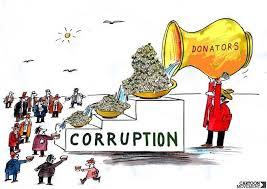Focus on Africa-Case studies on modern examples of scapegoating in failed governments particularly Nigeria By Hugo Keji

Case Studies on Modern Examples of Scapegoating in Failed Governments: The Case of Nigeria
Scapegoating in failed governments is a prevalent tactic used to divert attention from systemic issues and failures of governance. Nigeria, a country with a complex socio-political landscape, provides a pertinent example of how scapegoating is employed by leaders to manipulate public perception and maintain power. This section delves into specific instances of scapegoating in Nigeria, exploring the mechanisms and impacts of these practices.
Section 5: Case Studies - Nigeria
Nigeria has a history of political instability, economic challenges, and social divisions, making it a fertile ground for scapegoating by its leaders. Below are several notable examples of scapegoating in Nigeria’s contemporary history:
-
Boko Haram Insurgency
- Background: Boko Haram, an Islamist militant group, has been a significant threat to Nigeria’s security since 2009. The group's activities have resulted in thousands of deaths and displacement of millions.
- Scapegoating Dynamics: Successive Nigerian governments have often blamed external influences and political rivals for the rise and persistence of Boko Haram. The administration of former President Goodluck Jonathan, for instance, was criticized for accusing opposition parties of sponsoring Boko Haram to destabilize the government. This narrative was used to deflect from the government's failure to effectively combat the insurgency and protect citizens.
- Impact: The scapegoating led to increased political polarization, undermined collective efforts to address the insurgency, and diverted attention from necessary security reforms and strategies.
AfriPrime App link: FREE to download...
https://www.amazon.com/Africircle-AfriPrime/dp/B0D2M3F2JT
-
Economic Downturn and Ethnic Tensions
- Background: Nigeria's economy, heavily reliant on oil, has faced significant downturns due to fluctuating oil prices and mismanagement. Additionally, the country is ethnically diverse, with deep-seated tensions between various groups.
- Scapegoating Dynamics: Economic challenges have often been blamed on ethnic groups or regional entities. For example, during economic crises, Northern leaders have sometimes blamed the predominantly Southern oil-producing regions for economic mismanagement, while Southern leaders have accused the North of corruption and resource misallocation.
- Impact: Such scapegoating exacerbates ethnic tensions, fuels regional distrust, and hinders national unity, making collaborative economic recovery efforts more difficult.
-
Fulani Herdsmen Crisis
- Background: Clashes between Fulani herdsmen and farming communities have escalated in recent years, leading to significant loss of life and property.
- Scapegoating Dynamics: Political leaders have often blamed these conflicts on ethnic and religious differences, accusing rival political groups of inciting violence for political gains. For instance, during President Muhammadu Buhari's tenure, there were accusations that opposition elements were stoking the herdsmen-farmer conflicts to undermine the government.
- Impact: The scapegoating has polarized communities, distracted from the underlying issues of land use, migration, and climate change, and impeded the development of sustainable conflict resolution mechanisms.
-
End SARS Protests
- Background: In October 2020, Nigeria witnessed widespread protests against police brutality, specifically targeting the Special Anti-Robbery Squad (SARS). The protests were driven by young Nigerians demanding accountability and reforms.
- Scapegoating Dynamics: The government responded by accusing the protesters of being influenced by foreign agents and political opponents. This narrative was pushed to delegitimize the protests and avoid addressing the systemic issues within the police force and broader governance.
- Impact: The scapegoating led to violent crackdowns on protesters, undermined trust in the government, and failed to address the legitimate grievances that sparked the protests, resulting in ongoing discontent and calls for reform.
Conclusion
Scapegoating in Nigeria serves as a tool for political leaders to deflect responsibility and maintain power amidst crises. By blaming ethnic groups, political rivals, or external influences, these leaders avoid addressing the root causes of Nigeria’s challenges, including insecurity, economic mismanagement, and social inequality. The impacts of scapegoating are profound, leading to increased societal divisions, weakened national unity, and prolonged suffering for the Nigerian people. Addressing these issues requires a commitment to transparency, accountability, and inclusive governance, ensuring that the true causes of problems are tackled, and genuine solutions are implemented.
AfriPrime App link: FREE to download...
- Questions and Answers
- Opinion
- Motivational and Inspiring Story
- Technology
- Live and Let live
- Focus
- Geopolitics
- Military-Arms/Equipment
- Beveiliging
- Economy/Economic
- Beasts of Nations
- Machine Tools-The “Mother Industry”
- Art
- Causes
- Crafts
- Dance
- Drinks
- Film/Movie
- Fitness
- Food
- Spellen
- Gardening
- Health
- Home
- Literature
- Music
- Networking
- Other
- Party
- Religion
- Shopping
- Sports
- Theater
- Health and Wellness
- News
- Culture

